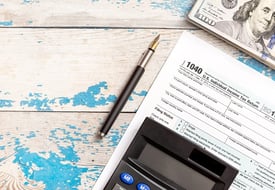Scura, Wigfield, Heyer, Stevens & Cammarota Blog
- Blog
Know Your Options – Treatment of Income Tax Debt in Bankruptcy
 Many individuals are saddled with income tax debt and seek help from the Bankruptcy Code to solve this issue in their life. Each provision of the bankruptcy code treats taxes differently and it is important to understand your options prior to filing for bankruptcy.
Many individuals are saddled with income tax debt and seek help from the Bankruptcy Code to solve this issue in their life. Each provision of the bankruptcy code treats taxes differently and it is important to understand your options prior to filing for bankruptcy.
CHAPTER 7 BANKRUPTCY AND TAX DEBT
In general, if an income tax debt was due more than three years prior to the bankruptcy filing (measured from the last date the return was due), then that income tax debt is generally dischargeable in a bankruptcy case pursuant to 11 U.S.C. § 507(a)(8). Dischargeable means that debt is no longer owed by the debtor after the bankruptcy is over. In a chapter 7 bankruptcy, the liquidation chapter, the bankruptcy process is not going to set up a period of time for an individual to pay off their tax debt (a payment plan). However, individuals can utilize a chapter 7 bankruptcy to discharge their dischargeable debt and then try to negotiate an agreement for the repayment of their non-dischargeable income taxes outside the bankruptcy. Often discharging debts such as credit cards and medical bills allows individuals to have the breathing room necessary to concentrate on repaying just the non-dischargeable income taxes.
CHAPTER 13 BANKRUPTCY AND INCOME TAX DEBT
A chapter 13 bankruptcy involves a sixty-month (or 36 months if the Debtor is below the State median income) repayment plan for debts that are owed. During the repayment plan a debtor devotes his or her monthly disposable income to the funding of a chapter 13 plan. Monthly disposable income means the money left over after calculating your income and deducting your expenses. As it pertains to non-dischargeable income tax debt, unless there is consent by the taxing authority, an individual must pay off all of their non-dischargeable income tax debt within the plan period in order to get a plan confirmed. All chapter 13 plans must be confirmed in order for a debtor to obtain a discharge at the end of the plan. One of the advantages of chapter 13 bankruptcy is that pursuant to 11 U.S.C. § 1322(a)(2) a debtor does not have to pay interest on priority income tax debt during the course of the plan period. However, if the income tax debt is secured (meaning the IRS has placed a lien on property towards satisfaction of the debt owed to them), then interest must be paid on the income taxes or the collateral that secures it must be surrendered.
CHAPTER 11 BANKRUPTCY AND INCOME TAX DEBT
A chapter 11 bankruptcy operates similarly to a chapter 13 bankruptcy as it pertains to income tax debt. Priority or secured income tax debt due within the three year priority period must be paid over a period not longer than five years from the date that the bankruptcy is filed. This is done through a reorganization plan that must be confirmed by the Court. However, a debtor must pay the present value of the priority income tax debt for the period from the date of confirmation of a chapter 11 plan until the tax debt is paid in full under 11 U.S.C. § 1129(a)(9)(C) (unlike in a chapter 13 where the claim can be limited to the amount owed). Therefore, a present value calculation must be applied in a chapter 11 plan where priority income tax debt is paid over time. Secured income tax debt that would qualify as priority unsecured tax debt if it was not secured by property must be treated the same way priority unsecured income tax debt is treated in a chapter 11. 11 U.S.C. § 1129(a)(9)(D).
Determining what your rights in relation to income tax debt in bankruptcy is far from a simple procedure. Therefore, it is important to contact an experienced bankruptcy practitioner if you find yourself in this situation to guide you through the process. Electing the appropriate chapter of bankruptcy and understanding the varied treatment of claims is essential.

David E. Sklar
Prior to joining Scura, Wigfield, Heyer, Stevens & Cammarota, LLP, David Sklar graduated from Rutgers University-Newark School of Law with a J.D., Cum Laude. Mr. Sklar was the recipient of a Pro Bono Award and was honored by the New Jersey Bar Association for his commitment to the Street Law Program by being awarded the Street Law Prize.
Share Article
Need Help? Contact Us Today!





Lists by Topic
- Bankruptcy (320)
- Personal Injury (95)
- Chapter 13 (52)
- Chapter 7 (50)
- Debt Management (50)
- Foreclosure (47)
- Accident (32)
- Car Accident (26)
- Chapter 11 (24)
- Business Bankruptcy (19)
- Credit (18)
- Insurance Claims (17)
- Business Law (12)
- Litigation (12)
- Employment Law (11)
- Probate and Estate Law (11)
- Damages (10)
- Medical (10)
- Product Liability (10)
- Workers Compensation (10)
- Attorney (9)
- Consumer Bankruptcy (9)
- Commercial & Residential Real Estate (6)
- Slip and Fall (6)
- Contracts (5)
- Premises Liability (5)
- Repossession (5)
- wrongful death (5)
- Video | Bankruptcy (4)
- Bankruptcy Cost (3)
- Corporate Litigation (3)
- Trial Law (2)
- student loans (2)
- tax (2)
- Attorney Fees (1)
- COVID-19 (1)
- Certified Civil Trial (1)
- Dog Bites (1)
- News (1)
- Relocation Assistance (1)

